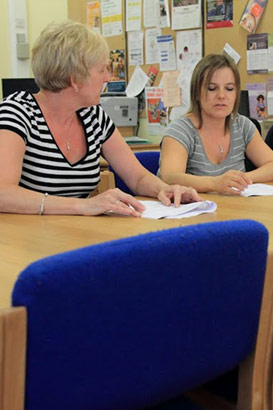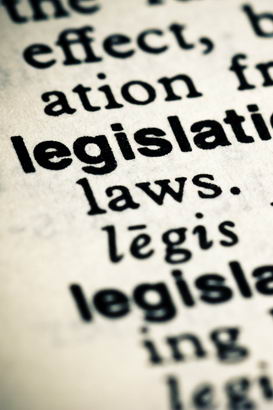The 0-25 SEND Code of Practice (2015, section xxiii) states: 'Here, and throughout this Code the term 'parent' includes all those with parental responsibility, including parents and those who care for the child.'
Click on the buttons below to discover how the terms 'parent' and 'parental responsibility' are defined in its 'Glossary of terms':
For further discussion of definitions of children, read the NSPCC's 'A child's legal rights' webpage here.
'Parents'
'Parental responsibility'
'Child' and 'young person'
Under section 576 of the Education Act 1996, the term 'parent' includes any person
who is not a parent of the child, but has parental responsibility (see below) or who
cares for him or her.
(0-25 SEND Code of Practice, 2015, Glossary of terms, p. 283)
Return
Parental responsibility is defined under Section 3 (1) of the Children Act 1989 as meaning all the duties, rights, powers, responsibilities and authority which parents have with respect to their children and their children's property. Under Section 2 of the Children Act 1989, parental responsibility falls upon:
- All mothers and fathers who were married to each other at the time of the child's birth (including those who have since separated or divorced);
- Mothers who were not married to the father at the time of the child's birth; and
- Fathers who were not married to the mother at the time of the child's birth, but who have obtained parental responsibility either by agreement with the child's mother or through a court order.
Under Section 12 of the Children Act 1989, where a court makes a residence order in favour of any person who is not the parent or guardian of the child, that person has parental responsibility for the child while the residence order remains in force.
Under section 33 (3) of the Children Act 1989, while a care order is in force
with respect to a child, the social services department designated by the order will
have parental responsibility for that child, and will have the power (subject to certain
provisions) to determine the extent to which a parent or guardian of the child may
meet his or her parental responsibility for the child. The social services department
cannot have parental responsibility for a child unless that child is the subject of
a care order, except for very limited purposes where an emergency protection order
is in force under Section 44 of the Children Act 1989.
(0-25 SEND Code of Practice, 2015, Glossary of terms, p. 283-284)
Return
Under the Children and Families Act, children and young people are differentiated in relation to compulsory school age. The Council for Disabled Children (2014) summarises this:
'A child is a person under compulsory school age. A young person is a person over compulsory school age but under 25 [years]. A person is no longer of compulsory school age after the last day of summer term during the year in which they become 16 ([Children and Families Act 2014,] section 83(2)).'
Reference
Council for Disabled Children (2014) The Children and Families Act 2014 Part 3:
Children and young people with special educational needs and disabilities: A briefing
from the Council for Disabled Children. London: Council for Disabled Children
[Online at: http://www.councilfordisabledchildren.org.uk/media/554523/ChildrenAndFamiliesActBrief.pdf;
accessed: 15.3.15]
Return
Involvement and participation of children’s parents and young people 'as fully as possible' has been given clear legislative emphasis (0-25 SEND Code of Practice, 2015, section 1.1; Children and Families Act 2014, section 19).
In terms of:
- Decision-making at individual level;
- Decision-making at strategic level;
In relation to:
- Aspirations and what they want to achieve;
- Their support needs and what's on offer.
'Children and young people and their parents or carers will be fully involved
in decisions about their support and what they want to achieve. Importantly, the aspirations
for children and young people will be raised through an increased focus on life outcomes,
including employment and greater independence.'
(0-25 SEND Code of Practice,
2015, Foreword)
Local authorities have established Information, Advice and Support Services (formerly known as Parent Partnership services) for parents in relation to special educational needs/disabilities (0-25 SEND Code of Practice, 2015 (CoP), section 2.4).
The information, advice and support should cover initial concerns or identification of potential special educational needs/disabilities, through to ongoing support and provision, which may include an Education, Health and Care (EHC) Plan. In addition, the local authority must ensure that children, young people and parents are provided with information and advice on matters relating to SEN and disability.
This should include:
- Local policy and practice;
- Local Offer;
- Personalisation and Personal Budgets;
- Law on SEN and disability, health and social care, through suitably independently trained staff;
- Advice for children, young people and parents on gathering, understanding and interpreting information and applying it to their own situation;
- Information on the local authority's processes for resolving disagreements, its complaints procedures and means of redress.
In addition, many local authorities provide or commission information, advice
and support services for young people separately from that of their parents.
(CoP, section 2.17)

Effective involvement of children/young people and parents in decision making
is premised upon the strategic weight in relation to statute relating to:
- Early identification of need and early intervention;
- The services that can reasonably be expected to be provided;
- The views, wishes and feelings of children/young people and children's parents;
- Full information, made accessible through appropriate presentation and support;
- The support provided to participate in decision-making.
(0-25 SEND Code of Practice, 2015 (CoP), sections 1.1, Foreword)
'Local authorities…must have regard to… the importance of the child or young person,
and the child's parents, participating as fully as possible in decisions…
the need to support the child or young person, and the child's parents, in order to facilitate the development of the child or young person and to help them achieve the best possible educational and other outcomes, preparing them effectively for adulthood.' (CoP, section 1.1)

'These principles are designed to support:
- The participation of children, their parents and young people in decision-making;
- The early identification of children and young people's needs and early intervention to support them;
- Greater choice and control for young people and parents over support;
- Collaboration between education, health and social care services to provide support;
- High quality provision to meet the needs of children and young people with SEN;
- A focus on inclusive practice and removing barriers to learning;
- Successful preparation for adulthood, including independent living
and employment.'
(0-25 SEND Code of Practice, 2015, section 1.2, referencing 1.1)
Under the 0-25 SEND Code of Practice (2015), schools and other education providers must:
- Inform the parents when 'SEN support' is provided for a child/young person (sections 5.38, 6.43);
- Provide a report for parents on their child's progress at least annually (section 6.64).
They should, when a child is receiving 'SEN support':
- Talk to parents regularly in order to:
- Set clear outcomes and review progress towards them;
- Discuss the activities and support that will help achieve them;
- Set out the expected impact on progress, development or behaviour;
- Identify the responsibilities of the parent, the pupil and the school;
- Set a clear date for review;
- Meet parents at least three times each year;
- Take into account the views of pupils in planning (eg through involving the pupil in all or part of the discussion, or gathering their views prior to it for presentation);
- Align meetings wherever possible with the cycle of discussions with parents of all pupils.
(sections 5.40, 6.64-6.70)

'These discussions [between schools and parents] will need to allow sufficient time to explore the parents' views and to plan effectively… These discussions can build confidence in the actions being taken by the school, but they can also strengthen the impact of SEN support by increasing parental engagement in the approaches and teaching strategies that are being used. Finally, they can provide essential information on the impact of SEN support outside school and any changes in the pupil's needs.' (0-25 SEND Code of Practice, 2015, section 6.66)
For further guidance on working with parents, read:
- 'Module 1.3: Talking to families; listening to families' in these Training Materials;
- Department for Children, Schools and Families (2009) Achievement for All – The Structured Conversation: Handbook to support training. Annesley: DCSF Publications.
The Children and Families Act 2014 (section 19) gives significant new rights directly to young people once they reach the end of compulsory school age (the end of the academic year in which they turn 16) with some rights transferring from the parent to the young person.
Nevertheless:
- Parents of young people can still access information, advice and support on behalf of, or with, the young person;
- Parents, or other family members, can continue to support young people in making decisions, or act on their behalf, provided that the young person is happy for them to do so;
- Young people can ask their parents, or others to support them (eg making decisions; with tribunals).
Staff should be clear about the transfer of some rights and responsibilities to young people, and work sensitively with parents to help them understand their role. (0-25 SEND Code of Practice, 2015, sections 2.12, 8.13)
To read more, link to the following sources on how parents can collaborate:
Under the 2014 special educational needs framework (Act, code of practice and regulations), a young person age 16-25 years or a child’s parent have rights to:
- Ask for an Education, Health and Care (EHC)
Needs Assessment; - Have their own views (orally or in writing) considered by the local authority for an EHC Needs Assessment;
- Request a specific school/institution be named in an EHC Plan;
- Make decisions about the support in their EHC Plan;
- Request
Personal Budget/Direct Payments if they have an
EHC Plan; - Appeal directly to the First Tier Tribunal about: EHC Needs Assessment-related decisions; EHC Plan matters; disability discrimination by schools/local authorities;
- Mediation about educational, health and social care issues.
Additional rights:
- Parents can ask for a special educational needs expert to attend a permanent exclusion review panel process;
- Under the Care Act 2014, young people can request transition assessments concerning needs that could be met by adult services after age 18 years.
Local authorities must notify the child's parent or the young person of rights to appeal EHC Plan decisions.

Providing that a young person at 16 years old has the capacity to make decisions, local authorities and other agencies should:
- Normally engage directly with the young person rather than their parent;
- Ensure that, as part of the planning process, they identify the relevant people who should be involved and how to involve them.
However, some young people may not have the capacity, in specific situations, to make decisions in their own best interest and will need support from a representative.
The common law 'functional' test of capacity under the Mental Capacity Act 2005 focuses on the decision-making process (British Medical Association, 2008). Click here for the test and further information.

Specifically in relation to particular decisions under the Children and Families
Act 2014, when a young person lacks capacity to make that decision, parents (unless
there is a
court-appointed representative) can make decisions on their behalf.
The Children and Families Act 2014 (Part 3, section 80) and the Special Educational Needs and Disability Regulations (nos 64, 65) give parents greater power than the Mental Capacity Act 2005, which requires only that parents are consulted and involved in decision-making, but gives them no legal authority to make decisions on the young person's behalf without being a court-appointed 'deputy'.
For information on how some decision-making rights transfer and mental capacity, read Chapter 8 and Annex 1 in the 0-25 SEND Code of Practice (2015).
For more information on young people with special educational needs/disabilities, adulthood and decision making, click here to read Irwin Mitchell's factsheet, 'Preparing for adulthood'.

All young people have the right to have their views taken into consideration about decisions that affect them (UNICEF, n.d.).
When a young person is over age 16 and the parents do not agree on an issue, it is legally the young person’s decision which prevails, subject to their decision-making capacity.
Local authorities should recognise the different needs of children, young people and parents... Where there are disagreements, staff providing information, advice and support should work impartially and separately with both the parents and the young person.
(0-25 SEND Code of Practice , 2015, sections 2.9, 2.13)

Young people with disabilities and special educational needs should be treated as having the capacity to make their own decisions, even if they need support to do so.
'The Children and Families Act 2014 requires local authorities to provide children
with information, advice and support relating to their SEN or disability. Many children
will access information, advice and support via their parents. However, some children,
especially older children and those in custody, may want to access information, advice
and support separately from their parents, and local authorities must ensure
this is possible.'
(0-25 SEND Code of Practice, 2015, section 2.10)
Information for young people:
SEN and disability support changes: information for young people
(Department for Education)

The 0-25 SEND Code of Practice (2015) defines 'Parent Carer Forum' in their 'Glossary of terms' (p. 283) as:
Parent Carer Forum: A Parent Carer Forum is a group of parents and carers of disabled children who work with local authorities, education, health and other providers to make sure the services they plan and deliver meet the needs of disabled children and families.
Find out more about their role within the special educational needs/disability framework by searching the term 'Parent Carer Forum' within the 0-25 SEND Code of Practice (2015). Also search 'parent partnership'.
See if you can get a sense of what parents understand and think about their rights under the 2014 special educational needs/disability framework by exploring some independent parent forums; for example, IPSEA - http://www.ipsea.org.uk; Special Needs Jungle: http://www.specialneedsjungle.com.


- British Medical Association (2008) Mental Capacity Act Toolkit.
London: BMA. [Online at: http://bma.org.uk/-/media/files/pdfs/practical%20advice%20at%20work/ethics/
mental%20capacity%20act%20tool%20kit_full.pdf; accessed: 14.3.15] - Council for Disabled Children (2014) The Children and Families Act 2014
Part 3. Children and young people with special educational needs and disabilities:
A briefing from the Council for Disabled Children. London: Council for Disabled
Children [Online at: http://www.councilfordisabledchildren.org.uk/media/554523
/ChildrenAndFamiliesActBrief.pdf; accessed: 15.3.15] - Department for Children, Schools and Families (2009) Achievement for All – The Structured Conversation: Handbook to support training. Annesley: DCSF Publications.

- Department for Education (2015) Governors' Handbook: For governors in maintained schools, academies and free schools. London: DfE. [Online at: https://www.gov.uk/government/publications/governors-handbook--3; accessed: 27.2.15]
- Irwin Mitchell (2014) 'Preparing for adulthood'. [Online at: http://www.irwinmitchell.com/medialibrary/IM%20COM/Hom
e/Documents/Children%20and%20Families%20Act%20201
4/PLS-AP41-CFAct_21_Preparing.pdf; accessed: 2.1.14] - National Network of Parent Carer Forums (2010) Parent Carer Participation: How to Guide. London: NNPCF. [Online at: http://www.nnpcf.org.uk/useful-information; accessed: 14.3.15]

- National Network of Parent Carer Forums (2014) 'The Children and Families Act: The role of parent carers when your child reaches 16' London: National Association of Parent Carer Forums/Contact a Family. [Online at: http://www.nnpcf.org.uk/wp-content/uploads/2015/01/NNPCF-Position-Statement-The-Role-of-Parent-Carers-when-your-Child-reaches-16.pdf; accessed: 28.2.15]
- NSPCC (n.d.) 'A child's legal rights: legal definitions'. [Online at: http://www.nspcc.org.uk/preventing-abuse/child-protection-system/legal-definition-child-rights-law/legal-definitions; accessed: 3.3.15]
- UNICEF (n.d.) 'Factsheet: the right to participation'. London: UNICEF. [Online at: http://www.unicef.org/crc/files/Right-to-Participation.pdf; accessed: 14.3.15]

- Contact a Family - Parent carer participation programme
- Department for Education (2014) 'SEN and disability support changes: information for young people'.
- IPSEA - http://www.ipsea.org.uk
- National Network of Parent Carer Forums - CAF Strengthening Parent Carer Participation
- National Network of Parent Carer Forums - Parent Carer Participation: How to Guide. Programme
- Special Needs Jungle: http://www.specialneedsjungle.com